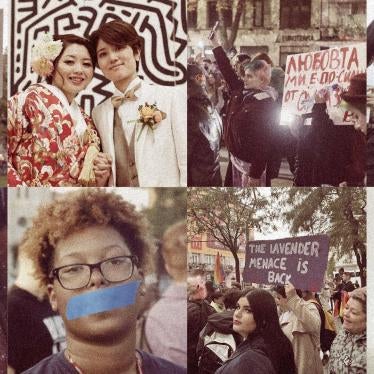(Jakarta) – The European Union should urge reforms in the Indonesian government’s laws, policies, and practices on human rights during a bilateral meeting on human rights on June 29, 2010, Human Rights Watch said in a letter to the EU released today. The EU-Indonesia Human Rights Dialogue, which will take place in Jakarta, is the first of what will be an annual inter-governmental meeting on issues related to human rights, democratic principles, and the rule of law in Indonesia.
In its letter, Human Rights Watch urged the EU delegation to use the meeting to secure specific commitments from the Indonesian government to improve freedom of expression; religious freedom; the rights of Indonesian domestic workers, most of them women, in Indonesia and abroad; and military reform and accountability.
“Indonesia’s human rights record has improved over the past decade, but reforms have been slow or nonexistent in several critical areas,” said Phil Robertson, deputy Asia director at Human Rights Watch. “The EU should highlight the need for real progress on issues the Indonesian government has swept under the rug.”
The Human Rights Dialogue is one outcome of a November 2009 EU-Indonesia comprehensive partnership and cooperation agreement that provides for increased cooperation between the EU and Indonesia in trade and investment, the environment, education, and human rights.
In its letter, Human Rights Watch made specific recommendations for measures that EU delegates should seek from the Indonesian government. On the issue of prisoners’ rights, Human Rights Watch urged the EU to call on the Indonesian government to release immediately and unconditionally more than 100 activists from Papua and the Moluccas imprisoned for peacefully expressing political views. The EU should also press Indonesia to open impartial and transparent investigations into all credible complaints of torture and ill-treatment in jails and prisons.
EU delegates should urge the Indonesian government to seek the repeal of several laws, regulations, and local by-laws that restrict religious freedom, and take significant steps to ensure that police protect members of religious minorities from attack by militant Islamist groups such as the Islamic Defenders Front, Human Rights Watch said. EU delegates should also press Indonesia to resume deliberations on legislation stalled in parliament that would extend labor rights protection for domestic workers and to strengthen protection for Indonesian domestic workers employed abroad both in legislation and bilateral agreements with receiving countries.
“The Indonesian government has come so close to enacting needed labor protections for domestic workers, but those efforts have stalled in recent weeks,” Robertson said. “The EU delegates should make it clear to Indonesia that protecting women’s rights is central to protecting all human rights.”
Human Rights Watch called on the EU delegates to raise several serious issues that did not appear on the dialogue agenda. Indonesia should seek the amendment or repeal of criminal defamation laws, which violate the right to freedom of expression, Human Rights Watch said. Indonesia should also reinvigorate stalled efforts on military reform, including by initiating credible investigations into serious human rights abuses by members of the military; ensuring that an ongoing process to reform the military's business interests actually results in the elimination of all forms of military commercialism, including formal and informal arrangements; and implementing reforms to allow the civilian criminal justice system to prosecute criminal acts by military personnel against civilians.
Human Rights Watch further called on EU delegates to urge Indonesia to play a strong role in the newly established ASEAN Intergovernmental Commission on Human Rights (AICHR). While Indonesia has appointed an independent representative to the AICHR who has the support from civil society, the commission’s terms of reference suffer from serious shortcomings, including a weak mandate that lacks a human rights protection element and inadequate provision of financial resources and support staff.
“The Indonesian government did the right thing by agreeing to hold annual rights talks with the EU,” Robertson said. “The challenge is to ensure that these meetings not just talk shop but make real progress by agreeing to specific steps and timelines for human rights improvement.”







